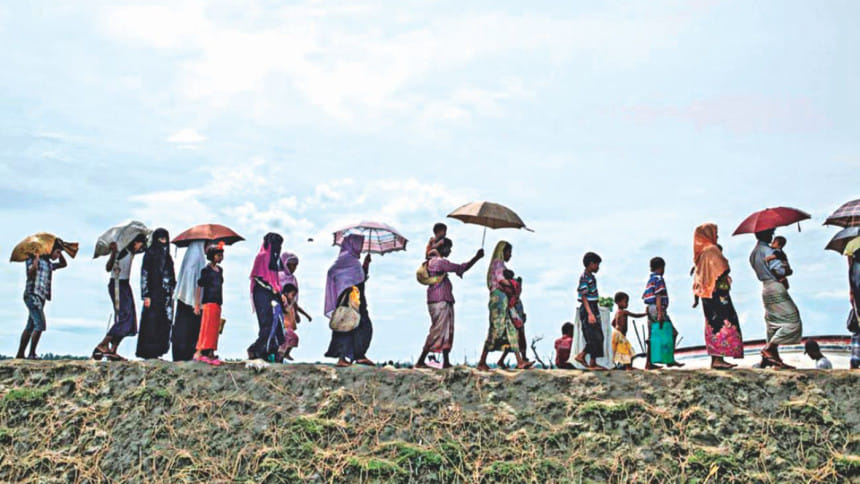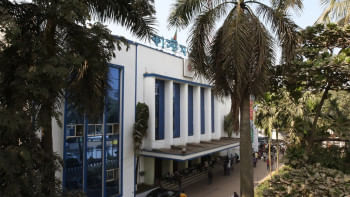Recognise the extent and seriousness of human trafficking

Every year, thousands of men, women and children fall victim to traffickers in their own countries and abroad. Despite seldom making the headlines, trafficking in persons also remains one of the biggest challenges for national security and law enforcement agencies throughout world—as the United Nations explained, "every country in the world is affected by human trafficking, whether as a country of origin, transit, or destination for victims."
The International Labour Organization estimates there are 21 million people globally who are victims of forced labour, and this includes victims of human trafficking for labour and sexual exploitation. According to a recent United Nations Office on Drugs and Crime's (UNODC) Global Report on Trafficking in Persons, nearly one-third of all human trafficking victims are children while 71 percent are women and girls.
However, because the problem is so widespread and well-entrenched, involving many major global crime networks, it is difficult to accurately estimate the total number of people trafficked every year—although, the majority of organisations that deal with human trafficking agree that wars and increased migrant flows because of wars increase the number of trafficking victims by a considerable amount.
This has been as true in recent times as it was in the case of Eastern Europe after the collapse of the Soviet Union and the Yugoslav Wars. Thus, North Africa, Sub-Saharan Africa, Middle East and parts of Asia are now the primary origins for trafficking victims, as these are the places that have seen the greatest instability in the most recent past.
This raises even more concerns for the Bangladesh government, which ranks poorly as it is when it comes to addressing this issue—as the Rohingya crisis next door could open the floodgates for traffickers to establish and perhaps even expand their base of operations nearby, if they haven't done so already to some extent. Indeed, according to the US State Department's Trafficking in Persons Report (June 2018), "Many women and girls among the estimated 687,000 Rohingya who fled from conflict in Rakhine to neighbouring Bangladesh since August 2017 have been subjected to sex trafficking in Bangladesh and India." And this has been further substantiated by other reports from around the world since the crisis began.
But even without the broader Rohingya problem, international organisations had already warned Bangladesh that is was not succeeding in preventing human trafficking, including within its own territories. This is particularly important to recognise because many cases of trafficking in persons, contrary to popular belief, do not involve the crossing of international borders. In fact, according to the UNODC's 2016 report, some 42 percent of detected victims in the world are trafficked domestically. And a large percentage of them, here in Bangladesh, are believed to be children who, according to Unicef, "are vulnerable to being trafficked into bonded labour or brothels." Additionally, trafficking of victims to India, Pakistan and the Middle East from Bangladesh is also "extensive", it said.
While all these are worrying enough, what is even worse given the seriousness of the situation is the lack of "effort" by the government to suppress trafficking, as the US State Department explained in its decision to downgrade Bangladesh to its Tier 2 Watch List in its Trafficking in Persons report back in 2017. Moreover, the Bangladesh government, in its view, "did not make efforts to investigate, prosecute, and convict allegedly complicit law enforcement, border, and manpower officials," despite "official complicity in trafficking crimes" being a "serious problem."
And this, perhaps, goes to the very heart of why human trafficking has increased so much in the last few years, as suspected by international human rights organisations. That is, an overwhelming failure to sincerely acknowledge the fact that human trafficking is, in reality, a form of modern day slavery—and must be abolished. As, despite the rhetoric by politicians and international organisations, effective and concerted effort to curb trafficking—except via the signing of treaties—has remained largely remiss.
And while on the one hand it is important to recognise human trafficking as a grievous crime through legislation and international treaties, what is equally, if not more important, is to take meaningful action to prevent human trafficking, to actively rescue victims of trafficking, and to create a mechanism which could provide them with the rehabilitation that is required. Unfortunately, none of them have been prioritised by our government and, indeed, by many other governments around the world.
Yet, we must still remain hopeful, especially given the more encouraging signs from some governments and international organisations. For example, arrests of human traffickers in the US increased exponentially in the last two years (from 1,952 in 2016 to 5,987 already in 2018). The biggest human trafficking website in the US was shut down only last year, and more and more world leaders are recognising the importance of fighting this menace—no matter who is involved in trafficking operations, as evidenced by the arrests of Smallville actress Allison Mack and philanthropist Clare Bronfman, daughter of billionaire former Seagram chairman, for their alleged involvement in the NXIVM cult and human trafficking.
From this, we can take a very important lesson. That is, it is not impossible to fight back against traffickers and perhaps even prevent human trafficking to some extent with enough effort and resources. So, although it is understandable that the Bangladesh government has some serious resource constraints, what is not acceptable is its lack of effort to stop trafficking and in rescuing victims of trafficking.
The same, however, can also be argued for most governments and international organisations, as we observe the UN's World Day Against Trafficking in Persons today. That is why it is now more important than ever for all of us to raise our voice against human trafficking, and through our sustained voice, put enough pressure on the global community as well as our respective governments, to address this terrible problem of serious human rights violations, once and for all.
Eresh Omar Jamal is a member of the editorial team at The Daily Star. His Twitter handle is: @EreshOmarJamal










Comments